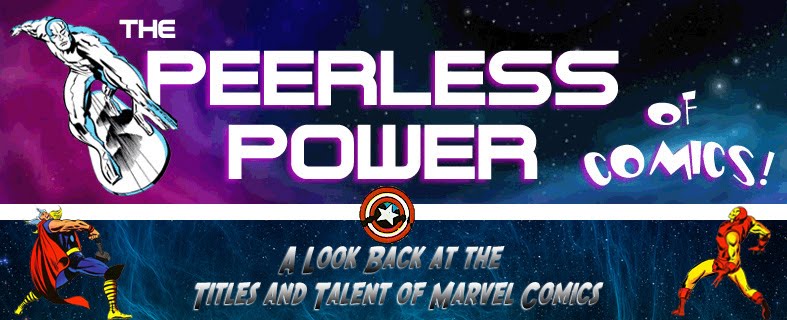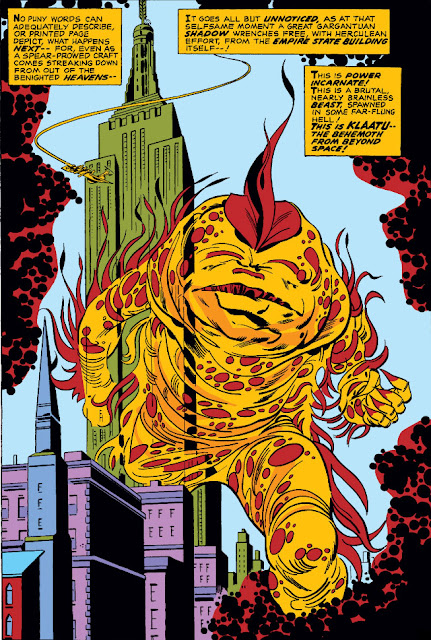The incredible Hulk hasn't had the best of luck in his encounters with ship captains--that is to say, those men who
Other than Captain Cybor, a man who secludes himself until midway into the second half of the story, there are several principal characters who help to hold our interest until that moment. For instance:
- Xeron, the Star-Slayer, who commands the oared "stalkboat" excursions away from the main vessel, the Andromeda, and who's tasked with the responsibility of harpooning Klaatu, the beast they pursue. It's unclear why Xeron holds such a position of authority aboard the Andromeda, aside from the fact that he appears to be responsible for tracking Klaatu; we also don't know why he's named "the Star-Slayer," which even the story's narrative all but admits is a name that had little forethought and suits him as well as any other. One doesn't usually go about the galaxy slaying stars, unless your name is Thanos, or Phoenix; from what we know of Xeron, he's simply a character who has good aim with a harpoon.
- In addition, we can see that the Hulk's mortal foe, the Abomination, has some part to play in this drama. There's of course no love lost between the Abomination and the Hulk; but complicating matters for the Hulk is that the Abomination turns out to be the first mate of the Andromeda, which technically puts him in a position of authority over the Hulk. You'd rightly assume that the rank the Abomination holds isn't going to mean anything to the Hulk in the least if it comes down to a battle between them; yet their meeting will to a degree be controlled by the circumstances in which the Hulk becomes more deeply involved in this bizarre quest.
- And where would the Andromeda be without its steadfast crew? Both Xeron and the Abomination make stern taskmasters who run a taut ship--treating their subordinates well but tolerating no slackers, with Xeron in particular promoting a strong sense of shipboard discipline and expecting each crew member to snap to at his orders. The crew of any vessel is how we usually learn the details of the men they serve and the voyage that they've undertaken--and it will be how the Hulk learns of their purpose, as well.
- As for Klaatu, an energy-absorbing creature who has managed to evade the single-minded pursuit of Cybor, he's little more than a mute catalyst in this tale, serving to draw all the parties together while establishing himself as a formidable being that has earned the enmity of Cybor, who, in turn, has the unwavering loyalty of Xeron to see him through this hunt.
Writer Roy Thomas has thus put together all the pieces we'll need for this story's conflict; but how the Hulk is drawn into this obsession of Cybor is a bit on the contrived side, as he follows nothing more than an unexplained compulsion to scale the Empire State Building (which just happens to be where Klaatu's energy form is waiting out the approach of Xeron's oarship). Finally, we get our first look at the mammoth creature Xeron hunts--but the Hulk's interference, while insignificant to Klaatu, forces Xeron to target a different creature today.
While back aboard the Andromeda, the Hulk awakens to find a more familiar face, if vague at first--but once the pieces fall into place, he realizes that an enemy stands before him, and acts accordingly.
While Xeron and the Abomination leave to placate Cybor, the Hulk is provided with a synopsis of the Andromeda's mission, as well as how the Abomination came to be its first mate (following his time in captivity on the Stranger's world). Yet there are nagging questions that remain afterward: Why does the Hulk himself remain a captive in this place? Twice now he's been attacked and humbled by Xeron--why does he endure such treatment? Why is Xeron not, in his eyes, an enemy to be smashed? Why isn't this behemoth charging through the bulkheads of this ship to reach Cybor, the one ultimately responsible for bringing him here against his will? Thomas attempts to smooth this unlikely transition from raging man-monster to willing prisoner--but is it enough?
"You wonder if your captors will willingly release you..."? Good grief, Hulk--isn't that your decision, without question?
But the Hulk's reverie is shattered by the unexpected attack of the Abomination, who casts him overboard to meet his death. Fortunately, other members of the crew spot the Hulk's plight, if not the reason for it, and Xeron is able to rescue him with that harpoon of his--but directly after the Hulk is brought back aboard, the three are summoned into the presence of Cybor, who had monitored the Abomination's complicity in the incident but makes it clear that the hunt for Klaatu takes precedence over any shipboard clashes.
In crew quarters, the Hulk rests--but this time, he transforms once more into Bruce Banner, who is naturally shocked by his surroundings and those who are understandably curious as to what has happened to his more massive counterpart. But to make Banner's state of mind even more chaotic, it's at this moment that Cybor sounds the alert that indicates Klaatu has been sighted leaving the Earth. For Cybor, the end of his vengeance is literally in sight--but in his haste, he makes a fatal error in judgment, one that will cost the lives of nearly the entire complement of those who crew the oar boats.
While the two who escape this tragedy resume their life-or-death struggle--though why they aren't dead already, exposed to the void well beyond the air fields surrounding the boats (particularly Banner!), is too much of a distraction, when a simple piece of narrative might have avoided it.
In the end, there is no positive note to apply to anyone involved in this tribulation, with all participants meeting their doom in one way or another, at least for now. Xeron's parting words of course overlook the Andromeda, which survives as "a monument" to Cybor--perhaps with even a few of the crew left aboard. As for our title character, the Hulk plummets back to Earth, to end up tangling with the Sandman--while the Abomination's plummet puts him into a two-year coma which ends with a rematch that lets him pick things up with the Hulk right where he left off (or so he thinks). Yet it's not long afterward when the Hulk crosses paths (er, waves) with another captain bent on conscripting him to his cause.
NEXT:
(That's Captain Omen to you!)
 | Incredible Hulk #s 136-137 Script: Roy Thomas Pencils: Herb Trimpe Inks: Sal Buscema and Mike Esposito Letterers: Jean Izzo and Artie Simek |
























4 comments:
I recall this story with great fondness, and may have been among the first comics I ever read. I snuck these issues from my older brother's comic collection not long after they came out, and upon reading them was utterly blown away. The eeriness of the massive ghost-like Klaatu and the slow-motion descent of both hunter and hunted into the Sun at the finale -- I still get the shivers from these images.
Being a first-grader, I had no idea how much Roy Thomas was cribbing from Moby Dick, re-casting it with spaceships and aliens, featuring Cybor as Ahab, the Hulk as Ishmael, and Klaatu as the titular whale...
I gotta say, the first thing I thought of on seeing Cybor was "Tharok!"
Half robot, bald, shorts and long socks - I think Herb was cribbing.
Tiboldt, that is an interesting resemblance--here I was thinking how odd Cybor looked as a ship's captain, dressed the way he was (is this man running his ship or getting ready for tennis?), when the explanation may indeed have had something to do with Tharok. I suppose if Thomas could be inspired by Melville, then Mr. Trimpe could take his inspiration from a DC character. All the bases seem to be covered by the language in fine print below each splash page: "No similarity between any of the names, characters, persons and/or institutions in this magazine with those of any living or dead person or institution is intended, and any such similarity which may exist is purely coincidental." I can't see that language being extended to withstand questioning under oath if the need arose, but what do I know.
C.N., as I was going through this story I was thinking of how well Trimpe laid it all out and brought all of Thomas's plots to life. Their work on Incredible Hulk was first-rate, and remains one of my favorite writer/artist collaborations.
In more than one interview/article, Roy expressed slight bafflement at how popular his time on the Hulk comic was, as by his own admission he cranked them out without a lot of due care and attention. Which possibly shows just how on fire he really was at the time, if this could be considered not-his-best-efforts.
Post a Comment